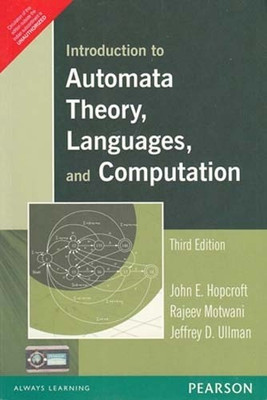Introduction to Automata Theory, Languages, and Computation 3rd Edition(English, Paperback, John E. Hopcroft, Rajeev Motwani, Jeffrey D Ullman)
Quick Overview
Product Price Comparison
Introduction To Automata Theory is a book on computer science and internet theories presented by writers John E. Hopcroft, Jeffrey D. Ullman, and Rajeev Motwani. Summary Of The Book This book can be considered as a standard on formal languages, the automata theory, and computational complications. It has been greatly improved, in order to offer theoretical ideas in a brief and lucid way. There has also been a development of practical applications. The latest edition also provides the readers Gradiance, an online assessment feature. The book opens up many interesting aspects and points it out to the readers. It elaborates theoretical ideas in a brief and understandable manner. The book harps on latest practical illustrations of its theories. It employs the usage of an array of numbers to assist readers in visualizing concepts. It also tries to evoke interest in the readers with comprehensive questionnaires at different difficulty levels after every chapter. The book also offers supplementary practice and quizzes along with the understanding of important ideas with an online homework and tutorial tool called Gradiance. By means of the programming labs, lecturers can now enjoy the liberty of assessing, locating, and sharpening the performance of their students in short intervals. It can be carried out with regards to syntax as well as linguistics, with an unparalleled standard of testing never presented previously. About the Authors John Hopcroft is best known as an American computer scientist. In addition to his contribution to planar graphs, he is also widely acclaimed for the HopcroftŌĆōKarp algorithm which searches for matches in bipartite graphs. Apart from this book, he is credited with authoring and co-authoring other books including Data Structures And Algorithms, The Design And Analysis Of Computer Algorithms, and Frontiers In Algorithmics. He obtained his master's degree and later, his PhD, from Stanford University. He served at Princeton University for a period of three years. After that, has been working at Cornell University. He is currently the IBM Professor of Engineering and Applied Mathematics in Computer Science at Cornell University. Jeffrey Ullman is a widely reputed computer scientist. Apart from this book, he is credited with authoring and co-authoring other books including Principles Of Compiler Design, Data Structures And Algorithms, and The Design And Analysis Of Computer Algorithms. His books on compilers, commonly referred to as the Dragon Book, theory of computation, commonly referred to as the Cinderella book, data structures, and databases are considered as references in their respective areas. He has been serving as a professor at Stanford University, as the Stanford W. Ascherman Professor of Computer Science. Ullman completed his Bachelor of Science in Engineering Mathematics from Columbia University. Later on, he earned his PhD degree in Electrical Engineering from Princeton University. Afterwards, he served for some years at Bell Labs. He then went on to become a professor at Princeton University. Rajeev Motwani was a reputed professor of Computer Science at Stanford University and an occasional writer. Apart from this book, he is credited with other works including What Can You Do With A Web In Your Pocket, Randomized Algorithms, and a paper on the Page Rank algorithm, the fundamentals for Google's search techniques. Motwani was a student of St Columba's School, New Delhi. He finished his B.Tech degree in Computer Science from IIT Kanpur and went on to earn his PhD degree in Computer Science from U.C. Berkeley in 1988. He passed away in 2009 and is survived by his widow Asha Jadeja, and two daughters.


